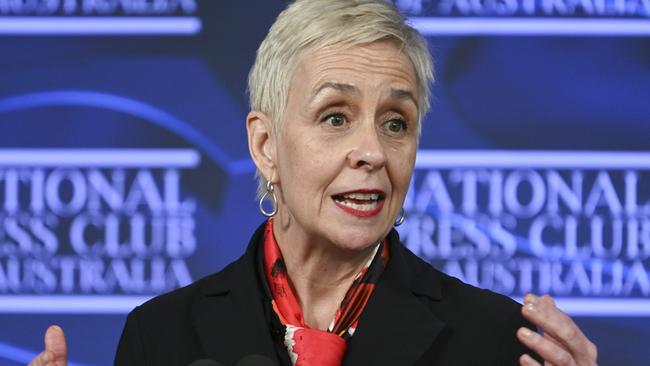Commissioner Micaela Cronin believes domestic, family and sexual violence should be taken as seriously as terrorism
Domestic, family and sexual violence needs to be taken as seriously as terrorism and the same tools should be used, Australia’s first commissioner in the field says.

Domestic, family and sexual violence needs to be taken as seriously as terrorism and the same tools should be used, including police monitoring social media for risky behaviour, the Albanese government’s top adviser has warned.
Micaela Cronin, the country’s first Domestic, Family and Sexual Violence Commissioner, also urged governments to help redefine masculinity and engage men effectively, saying “we need to have eyes on men in different ways than we do now”.
Handing down her first report card to federal parliament on progress of the government’s National Plan to End Violence against Women and Children, Ms Cronin said she was being told consistently by women to “please work with our men” and data uncovering how men become violent and stopped being violent was desperately needed.
Ms Cronin said domestic violence shouldn’t be treated as a form of terrorism, as is being discussed in the United Kingdom, but should be acted on just as urgently.
“It is not terrorism in the same way and I think that what we need is for the community to take as seriously (the) threat of domestic, family and sexual violence as they take terrorist threats. Act on them as urgently and recognise that they are different,” she told the National Press Club in Canberra.
“If we called Molly Ticehurst’s murder terrorism then most of the community would be shaking their head going, ‘what are you talking about? That doesn’t make sense to me’. If we took the tools that we have to the risk assessments about her puppy was killed, all the things that led up to (her murder), if we were watching that the way we watch people who are labelled as terrorists in our communities then she might still be alive today.”
Childcare worker Ms Ticehurst, 28, was found dead in her home in Forbes on April 22. Her former partner has been charged with murder and is in custody on remand.
With just 16 of the 34 sub-outcomes in the government’s national plan able to be measured, Ms Cronin said she was determined to get new data broken down by jurisdiction next year.
Noting there were 9000 domestic, family and sexual violence workers compared to 80,000 people in the police force and 800,000 in healthcare, Ms Cronin said employees in those sectors needed to recognise that domestic, family and sexual violence was “core business”.
“It’s not somebody else’s business and we need to build the capability of those workforces to respond appropriately and well when they have an opportunity,” she said.
“We need to see it as an opportunity for prevention, for preventing the cycle continuing, for preventing further harm.”
Ms Cronin said some of the best successes in keeping women safe was when high-risk teams had an eye on men but so much of the system was designed around having eyes on women, who were much more visible.
“Men often don’t, if they put up their hand and say ‘I’m concerned about my behaviour’ … there’s not much around to respond to them,” she said.
The national plan aims to end violence in a generation but intimate partner homicide increased from 34 in 2022-23 to 43 last financial year and there’s been an 11 per cent increase in sexual violence in the last year.
Ms Cronin said the report card to parliament was based on what the Domestic, Family and Sexual Violence Commission was hearing but there was still detailed data that needed to be published to inform whether the plan was on track.
“I would say that we are on track in many regards,” she said.
“I think the commitment that we are the generation that transforms this country’s response to domestic, family and sexual violence is absolutely on track. I do feel very hopeful about the future.”



